How Much Sleep do Endurance Athletes Need?
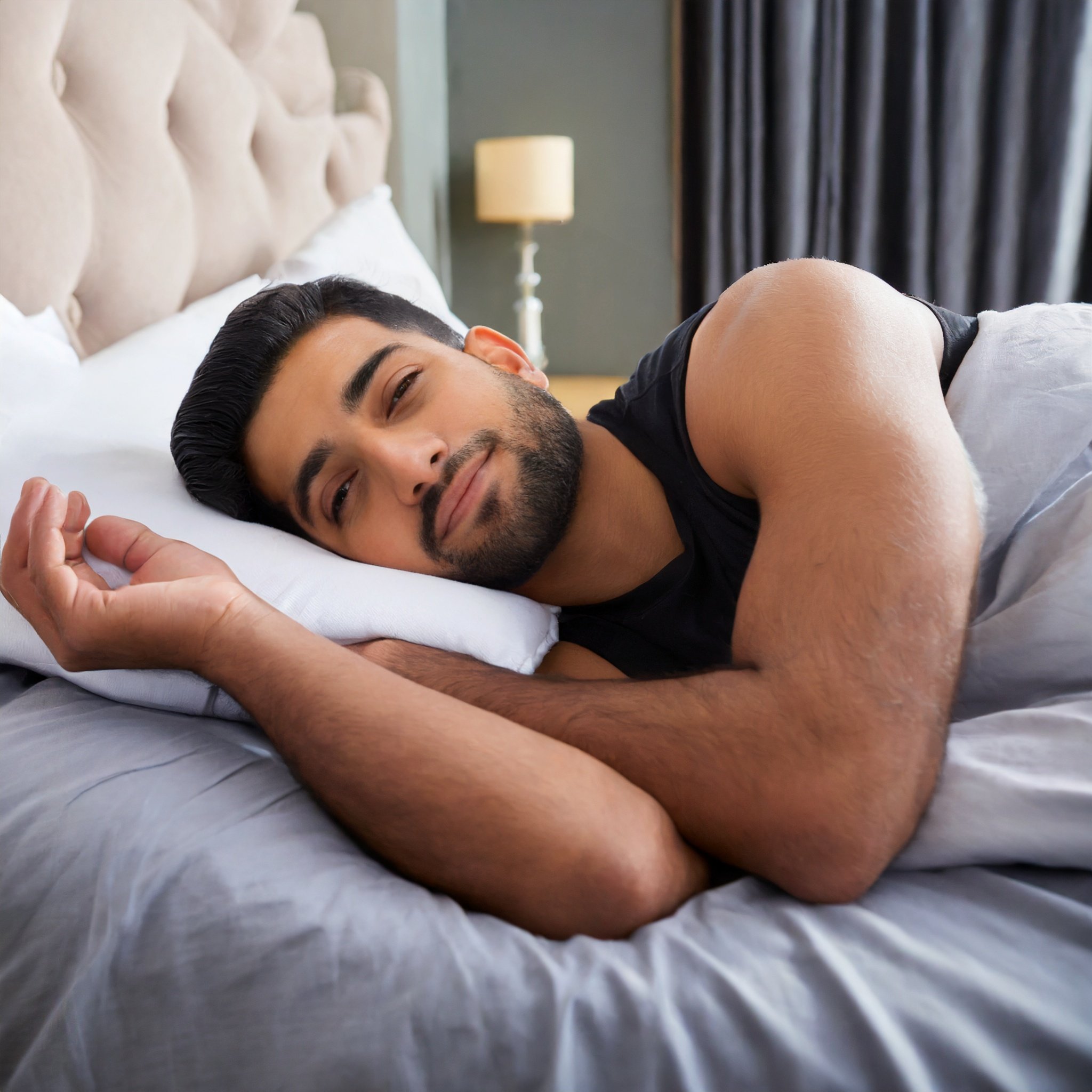
I’ve always liked to sleep…but I’ve not always been able to get a good night’s sleep. I seem to naturally be a night time worrier and a night owl, so will often not prioritise bed time over…well anything really. Then once I’m in bed I can lie awake for hours putting the world to rights. With the hotter summer months upon us and (hopefully) racing due to start before too long, I thought it would be a good time to have a think about sleep and how important it is for performance in endurance sports.
So how much sleep do endurance athletes need? A general rule of thumb is between 7 and 9 hours per night for adults, but studies suggest athletes may in fact need closer to 9 or 10 hours per night for optimum performance.
In our busy post-modern world, finding 9 or 10 hours to sleep in each 24 hour period may seem like an impossibility, however, there are lots of good reasons why endurance athletes in particular would do well to invest that time. Here are just a few of the negative consequences of not getting enough sleep:
Reduced athletic performance
Studies have shown that sleep deprived athletes perform less well, have a greater relative perceived exertion and are at a greater risk of injury (Watson, A, ‘Sleep and Athletic Performance’ in Current Sports Medecine Reports, 11/12/2017 vol 16 issue 6 pp 413-418).
Pre-exercise muscle glycogen stores were found to be depleted in sleep deprived athletes, and as these are key to long endurance events, this may have an impact on your performance. This is also borne out by the decrease in time to exhaustion noted in sleep deprived athletes, possibly compounded by the increase in Relative Perceived Exertion in relation to actual output.
Sleep is the time when you are actually getting fitter as your muscles adapt to the training you have done that day, in particular it is Stage 4 REM sleep that provides the optimum environment for your body to recover. After a hard session and sleep deprivation, adult cyclists’ 3km time trial time went down by an average of 4%.
Reduced motor skills
A study by Joanna Lowrie and Helen Brownlow for BMC Public Health published on 22nd June 2020 showed that men and women deprived of sleep for 24 hours performed worse in driving simulated tests than if they had 50mg alcohol/100ml of blood in their body. Which serious athlete would dream of going to their session after a pint? Well, if you are depriving yourself of sleep, you’re doing a similar thing. For off road events in particular this basically means you are more likely to have some kind of accident and, given your problem solving skills will also be compromised, less likely to be able to deal with the consequences.
Poor mood management
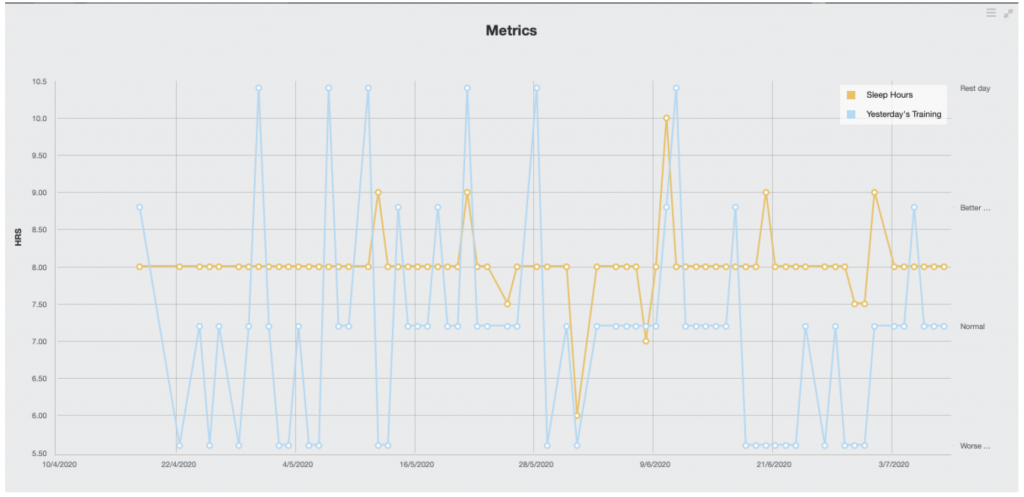
Ever been in the same room as a toddler when they’ve not had their afternoon nap? Well grumpiness is not just the remit of toddlers, sleep deprivation has been linked to poor mood management in adults too. Nobody really knows why we dream, but it is thought that it is part of processing emotions; this happens in REM or stage 4 sleep, when the activity in the amygdala (the emotional centre of the brain) is particularly active.
One thing we know about performing at our best, is that our mood can play a massive role in how we perform both in training and racing. We need to be motivated for those early morning sessions and particularly hard efforts. In ultra and multi-day events in particular there will be highs and lows, you could increase your chances of at least starting in a positive frame of mind by investing in some good sleep.
Poor problem solving skills
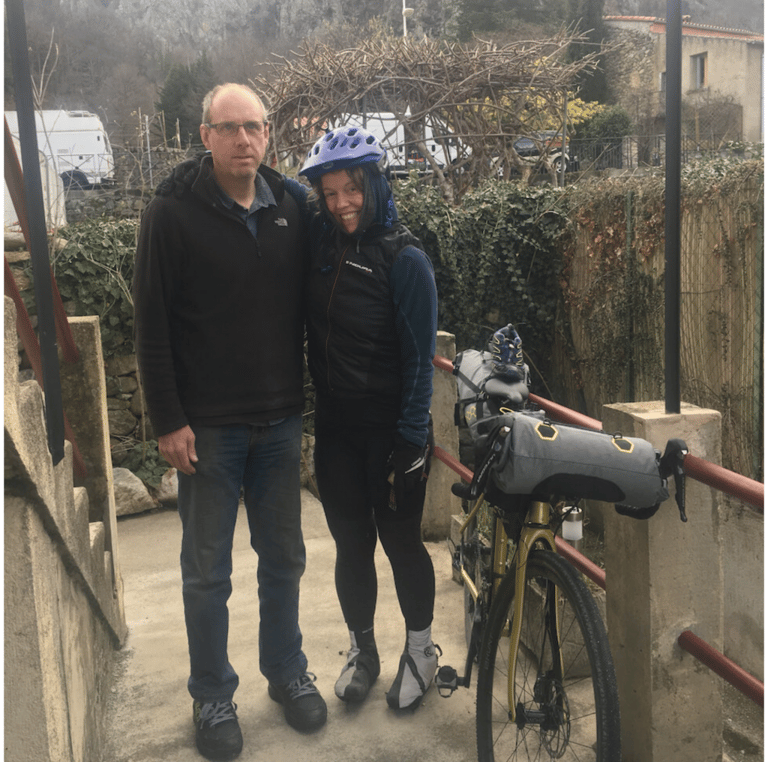
Any bike packer or ultra runner will tell you that problem solving is key to their events. Things can happen all the time in endurance races, in addition to the basic race skills needed (how to get food/water/map read). Success in these events is often based on our ability to be flexible and problem solve along the way; if you do not get enough sleep you are reducing your ability to complete the event at your optimum level or possibly at all.
On a day to day basis, we need cognitive functioning not just to live, but to decide how and when to train, and on longer training days problem solve along the way. Being able to plan our weeks and days and the training we want to do will happen far more smoothly if our cognitive skills are at their optimum!
Lowered immune system
Sleep deprivation lowers your immune system making you more susceptible to colds and flu. This can lead to unwanted time out from training due to illness. In addition to colds and flu, sleep deprived adults have also been shown to be more susceptible to diabetes and heart disease, all things we usually exercise to avoid!
As consistency is key in developing fitness, being susceptible to illness and injury not only decreases your chances of getting on the start line of a race, but also increases the amount of time you have out from training. Whilst not all illness and injury can be avoided, given that hard training itself compromises the immune system, the wise athlete might well consider a good night’s sleep to make sure they are at maximum levels before they start their session.
Weight gain
People who sleep less than 7 hours each night tend to be more susceptible to weight gain and are at a higher risk of becoming obese according to the NHS website. This has been linked to reduced levels of leptin in the sleep deprived (the chemical that makes you feel full) and increased quantities of ghrelin (the hormone that tells you you are hungry). The last thing we want as athletes is to gain excess weight, or for that matter, feel the unwanted pangs of hunger part way through a key session.
Mood disorders such as depression and anxiety.
Exercise can form a key part in managing low mood and anxiety. People with mood disorders and anxiety have been found on average to sleep for less than 6 hours per night. If you are struggling with your emotional health and using endurance sport as part of your management and recovery, it may be worth considering investing some time in getting a better sleep routine both for your sport and your emotional health.
What is Sleep Deprivation?
Sleep deprivation is going any length of time without enough sleep and can vary from a long period of no sleep at all to days, weeks, months and years with too little sleep. Clearly for endurance athletes this is pertinent as in some events we are going to be sleep deprived due to the nature of the event (ultra events and multi-day adventures). Whilst sleep deprivation may be unavoidable in these situations, it’s worth weighing up the losses and gains of less sleep against reduced performance; you may find that you actually have a better race overall if you have more sleep time each night than if you plough on with less.
How do I know if I’m Getting Enough Sleep?
Athlete questionnaires have previously revealed that athletes have a poor self-assessment of their own sleep needs and quality (Watson, A, ‘Sleep and Athletic Performance’ in Current Sports Medecine Reports, 11/12/2017 vol 16 issue 6 pp 413-418). A good way to monitor your sleep patterns is to keep a diary logging the number of hours sleep you have per night, the quality of that sleep your performance in training and general fatigue levels. With the development of better and better sports watches and equipment, a lot of watches will assess your sleep for you.
This has been a significant factor in the recovery of one of our athletes, who after a lengthy time away from sport due to fatigue and illness began to focus in a little on sleep. With John’s help she began logging how much she slept and comparing it to her heart rate variability (ie her readiness to train) and the results were pretty compelling. As you can see, in March just after her sleep hours increased her Heart rate variability went up, similarly in May you can see how the heart rate variability increased (with a small time lag) with the increase in sleep hours. This clearly shows, that for this athlete just getting more sleep actually meant she was more ready to train.
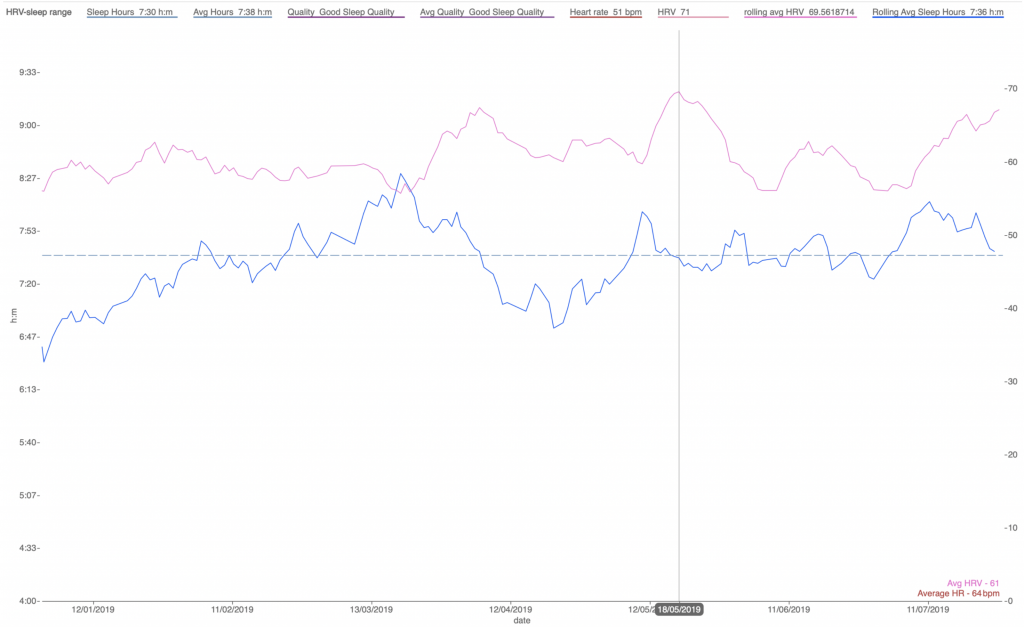
If you’re not one for metrics and data however, a good sign that you are getting enough sleep is, all else being equal, if you waken naturally and refreshed at the same time each day.
Sleep Quality
It’s all very well religiously going to bed at the same time each night and getting up at the same time, but the quality of the sleep we get also has an impact on how much it helps us. It’s worth addressing the following ongoing problems which can interfere with your sleep quality:
- Restless leg syndrome – there is some evidence that there is a higher instance of this problem amongst athletes; it will almost certainly interrupt your sleep and prevent you from getting a good night’s rest.
- Back, neck and joint pain are all likely to prevent you falling asleep and waken you in the night. Whilst it can’t always be avoided, investing in a good quality mattress and pillows can make a massive difference. I certainly noticed a massive difference in both sleep quality and back pain when we invested in a memory foam mattress.
- Drinking too much caffein – it’s worth cutting back on the caffein in the hours before bed as this stimulant will keep you awake. Drinking caffein free and herbal teas can be a good alternative, there are some pretty good sleep inducing teas on the market!
- Anxiety – anxiety can really hit hard at night, preventing you from dropping off to sleep or wakening you before dawn. Investing some time in dealing with your anxieties can be well worth the effort. I’ve found that making a worry list and problem solving the worries at an earlier point in the day really helps with this.
- Training in the evening – doing sessions late in the day and early evening, whilst unavoidable for most full time workers can have a massive impact on our ability to fall asleep at an appropriate time. Raised cortisol and norepinephrine levels from training can remain high for some time after hard work outs which can interfere with our ability to fall asleep at our usual time. It’s worth considering a lunchtime session or one straight after work if you find yourself unable to sleep after a hard work out. Of course if you consistently struggle with sleep, waken thirsty in the night and notice a drop in performance, you may also be over-training, for more details about this see this related article.
Mostly, it’s clear when we’ve had poor quality sleep because we have been restless, waking frequently, but some other factors can also affect sleep quality in less obvious ways:-
- Alcohol – we may in fact think that we sleep well after alcohol, but the sleep quality we get is poor; the chemical changes from alcohol reduce the amount of REM, stage 4 sleep we get, increase the amount of alpha brain activity (normally turned off in sleep) and interrupt our natural circadian rhythm making us waken early. As it’s a diuretic we usually have to get up in the night to pee after drinking alcohol as well.
- Sleep apnea – people with sleep apnea have breathing difficulties in the night leading them to constantly pull from deep to light sleep unnaturally throughout the night, causing poor quality sleep.
Travel and Sleep
We all love an adventure and often a large part of endurance training is aimed towards a big adventure race. However, crossing time zones and the related jet lag is another important factor when planning to be at your optimum performance levels for your race. Watson, cited above, suggests that allowing one day per time zone crossed is required in order to be able to optimally perform without jet lag. Additionally adjusting your rhythms prior to travel may also offset some of the negative effects of differing circadian rhythms in a different time zone.
Of course, it’s not just time zones that we need to factor in with endurance training, regular long travel to training venues and a long drive before and after an event can all impact on our ability to recover and get good sleep. When I first started going to track sessions, this required two train journies which meant I didn’t get home until late, a late tea followed by a late night was the worst possible recipe for getting the most out of my hardest session of the week. I now try to train as close to home as possible through the week so that I can get home have tea and a good night’s rest afterwards.
As travel by itself can be tiring, especially if you are the driver, it’s worth factoring this in to any event. If at all possible, I like to be on the site of the event the night before a race so that I can have a good sleep and relaxing morning before the start. Travelling after an event can also be dangerous as fatigue levels are high and as we saw earlier this is worse than drinking on your driving performance. I am lucky enough to have a partner who will often drive me to and from events which makes a big difference, otherwise for longer events I often try to stay the night after as well (easily done with a campervan!).
High Altitude and Sleep

If you are not accustomed to it, being at altitude can also really affect your quality of sleep, primarily as reduced oxygen changes your breathing pattern causing periods of deep breathing followed by shallow breathing. This induces frequent awakenings during the night, reducing total sleep time and sleep efficiency, including the amount of that all important REM sleep you get (‘Effects of High Altitude on Sleep and Respiratory System and Their Adaptations,’ Turhan San, Senol Polat, Cemal Cingi, Gorkem Eskiizmir, Fatih Oghan and Burak Cakir in Scientific World Journal April 2013).
My own experience of this has been frequent weird dreams, waking up thirsty in the night and feeling groggy, grumpy and lethargic during the day. If you are planning on racing at altitude, it’s always a good idea to try and do some high altitude training; the jury is out about whether to train high, sleep low or vice versa; there seem to be merits to both. I have only ever trained high and slept high as part of any altitude training and this has worked well for me.
How to Get Better Sleep.
If you are serious about being fit then you need to be serious about your sleep. Getting good quality sleep for a good number of hours each day is going to increase your performance levels daily and for your key race. Here are some good ways of helping you get the sleep you need:
- Have a regular bedtime and wake up time
- Turn the tv/computer/smartphone off half an hour before you want to sleep
- Sleep in a different room from your daily activities (or a different clearly defined part of a room)
- Invest in a good quality mattress and bedding
- Keep the temperature at between 16 and 18 degrees celsius
- Have a bedtime routine which is the same every night
- Having a snack with carbohydrates and protein – this will help with the production of tryptophan, a sleep inducing chemical, hot (plant based) milk is perfect.
If after all the above you still struggle to sleep you could try some relaxation methods or hypnosis.
Related questions
Can I get too much sleep? -People’s sleep requirements do vary and some people naturally seem to need more than others. However, if you find yourself sleeping alot and not feeling refreshed it may be worth seeing a doctor to check there is not an underlying medical cause.
What’s the best way to combat the sleep deprivation in longer events? Unfortunately, we can’t bank sleep, having a good sleep after a period of being sleep deprived will help us recover but the opposite is not the case. The best way to combat sleep deprivation during long events to have a regular good sleep routine and maybe one or two practise events at night so you can learn how you behave when sleep deprived and put plans in place to deal with it. This will also help you decide whether you are better allocating more or less sleep time to perform optimally for your event.
June 25, 2020
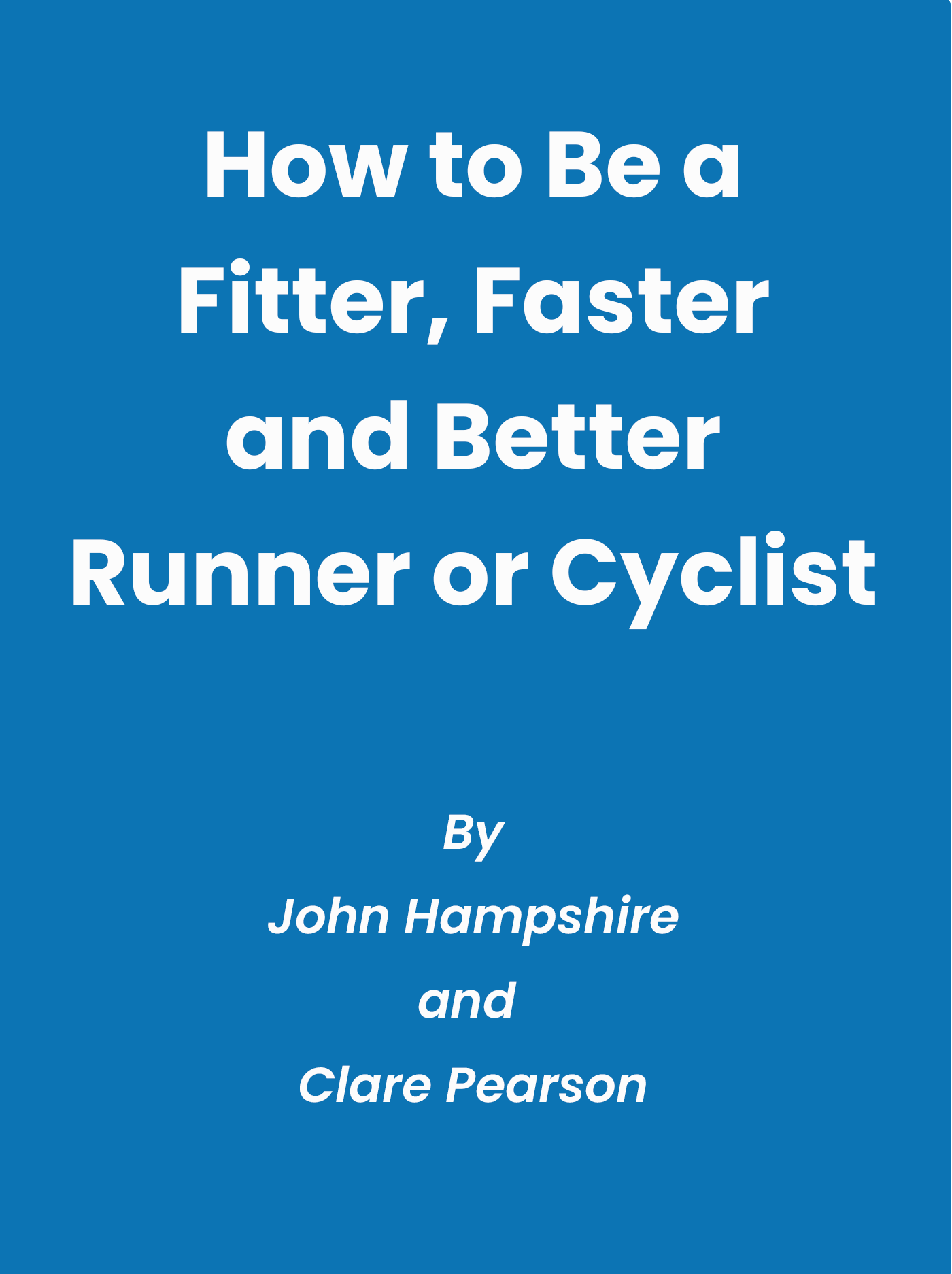
Comments